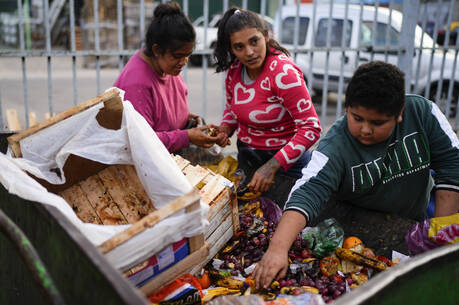Construction of facilities in Brazil for the 2014 FIFA World Cup and the 2016 Olympic Games were in full swing last year when a wave of street protests swept through the country.
“We want a soccer association-style hospital,” read one demonstrator’s sign, a reference to the quality of the local government health center compared with the new structures going up for the sporting event.
That sentiment is symptomatic of a deeper discontent taking shape around Latin America as a decade-long economic boom slows down and voters in about half the region’s countries prepare to elect national presidents this year. In countries newly emerged from the ranks of the poor—where a burgeoning middle class is buying new cars and running up credit-card debt as shopping malls and high-rise apartment buildings alter the urban skylines—the seven heads of state elected in 2014 will wrestle with many of the challenges that Pope Francis has warned about over the past year.
Looming largest on the list are “inequalities and inclusion of all members of society,” said Roxana Barrantes, an economics professor at the Pontifical Catholic University of Peru, who also heads the Institute of Peruvian Studies, a social sciences research center in Lima. “In many countries in Latin America, people are openly questioning the high degree of inequality in income distribution and in opportunities for people who [traditionally] have been excluded, particularly original peoples,” Barrantes said.
Recent years of economic upheaval in the United States and Europe brought boom times to Latin America, as financial investment in the region rose and countries profited from high international prices for commodities like minerals and oil.
The bonanza galvanized domestic economies and lifted many people above the poverty line for the first time in decades. By 2012, the proportion living in poverty had dropped to 28 percent. But 164 million people—a figure roughly equal to half the U.S. population—still live on the bare minimum needed to survive.
The benefits of the economic boom have varied from country to country—nearly half of all Salvadorans still live in poverty, compared with 7 percent of Uruguayans—and within countries, where poverty rates and the lack of job and educational opportunities are highest in rural areas and among indigenous people. Perhaps most telling are the figures for income inequality. Nearly half the region’s income goes to the wealthiest 20 percent of the population, while the poorest 20 percent receive only 5 percent.
Pope Francis had that in mind when he told political and business leaders at January’s World Economic Forum in Davos, Switzerland, “The successes which have been achieved, even if they have reduced poverty for a great number of people, often have led to a widespread social exclusion.”
He had already warned about the serious consequences of those disparities. “Until exclusion and inequality in society and between peoples are reversed, it will be impossible to eliminate violence,” the pope wrote in his first apostolic exhortation, “Evangelii Gaudium.”
“Just as the commandment ‘Thou shalt not kill’ sets a clear limit in order to safeguard the value of human life, today we also have to say ‘thou shalt not’ to an economy of exclusion and inequality,” he wrote.








